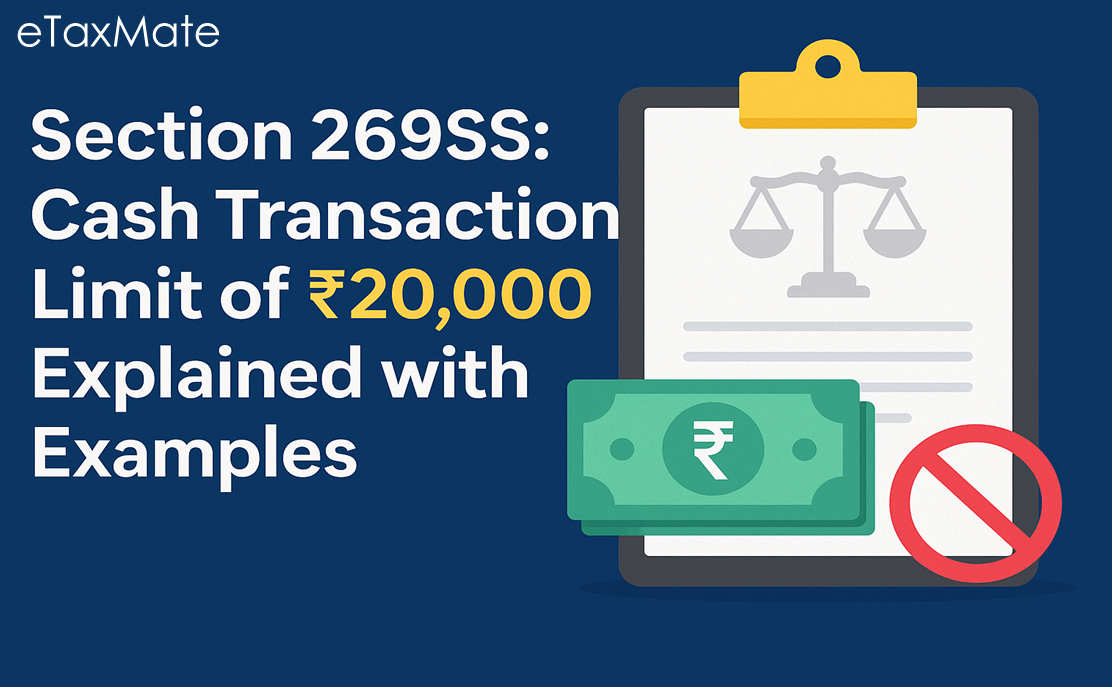
Introduction: The Hidden Risk in Everyday Cash Dealings
In our day-to-day lives, it’s common to lend or borrow money in cash from friends, family members, or even acquaintances—especially in times of urgency or trust-based informal arrangements. These transactions are often carried out with good intentions, without any formal documentation or thought of legal implications.
However, what most of us don’t realize is that even such innocent cash dealings can trigger serious consequences under the Income Tax Act. Accepting or repaying money in cash—beyond a specified limit—can lead to violation of legal provisions, potentially resulting in hefty penalties.
To curb the use of unaccounted money and ensure financial transparency, the government has put in place several stringent rules. One such important provision is Section 269SS, which restricts cash transactions of ₹20,000 or more in certain cases.
In this blog, we will walk you through these legal provisions designed to discourage cash transactions, starting with Section 269SS—a rule that many are unaware of, but one that carries serious repercussions if ignored.
What Exactly Does Section 269SS Cover?
Section 269SS of the Income Tax Act, 1961 specifically deals with the mode of accepting certain amounts—and applies only to loans, deposits, and certain specified sums.
Let’s break it down:
1. Loans and Deposits
This includes:
- Any loan or deposit accepted by a person from another person.
- Whether interest-bearing or interest-free.
- Whether temporary or permanent in nature.
Even a friendly loan from a close relative in cash that exceeds the threshold could come under the scanner of this provision.
2. Specified Sums
In addition to loans and deposits, the section also applies to “specified sums” which refer to:
Any sum of money received in relation to the transfer of an immovable property (such as advance payment), whether or not the transfer eventually takes place.
So, if you accept ₹20,000 or more in cash as an advance for selling or buying property, it could attract the provisions of Section 269SS.
In essence, Section 269SS doesn’t cover all types of cash receipts, but it does tightly regulate:
- Loans
- Deposits
- Property-related advances
Applicability:
Loans (L), Deposits (D), and Specified Sums (SS) must be accepted only through the following modes:
- Account Payee Cheque
- Account Payee Bank Draft
- Electronic Clearing System (ECS) through a bank account
- Other prescribed electronic modes
This applies when any of the following conditions are met:
Condition 1: The amount of loan, deposit, or specified sum received is ₹20,000 or more
Or
Condition 2: The amount received on the current occasion is less than ₹20,000, but the outstanding unpaid amount from earlier occasions with the same depositor is ₹20,000 or more
📌 Example: Suppose you took a cash loan of ₹15,000 from Mr. Sharma last month. Now, on the current occasion, you take another ₹10,000 in cash from him. Although this ₹10,000 is less than ₹20,000, the total unpaid loan amount from Mr. Sharma is now ₹25,000 (₹15,000 + ₹10,000), which exceeds the ₹20,000 limit.
In this case, Section 269SS requires that the ₹10,000 on the current occasion must be accepted only through an account payee cheque, bank draft, or electronic mode—accepting it in cash would be a violation.
Or
Condition 3:The amount received on the current occasion is less than ₹20,000, and
The unpaid amount from earlier occasion with the same depositor is also less than ₹20,000, but
The aggregate of current receipt + outstanding unpaid amount is ₹20,000 or more
📌 Example:
Let’s say:
- You previously took a loan of ₹12,000 from Ms. Gupta, which is still unpaid.
- Now, you take another ₹9,000 from her in cash.
Here:
- ₹9,000 (current loan) + ₹12,000 (outstanding unpaid) = ₹21,000 (total exposure)
Even though neither transaction individually exceeds ₹20,000, the combined total crosses the ₹20,000 threshold.
✅ Therefore, the ₹9,000 must be accepted only via account payee cheque, bank draft, ECS, or other prescribed electronic modes. Accepting it in cash will violate Section 269SS.
📝 Key Notes on Section 269SS:
- Applicability to Property Transactions:
Section 269SS also applies to cash received in connection with the transfer of immovable property, irrespective of whether the property is held as a capital asset or stock-in-trade. The nature of the holding does not affect the applicability of this provision. - Person-Wise Limit Evaluation:
The ₹20,000 threshold must be evaluated person-wise—that is, the total of loans, deposits, or specified sums accepted from a single person is considered. It is not the transaction count or type, but the identity of the person that matters. - Important Judicial Relief – Kailash Chandra Deepak Kumar (Allahabad High Court):
In this case, it was held that advances paid to suppliers in the ordinary course of business (e.g., to secure supply of goods) are outside the scope of Section 269SS, even if such payments are made in cash.
This decision offers important relief to traders and businesses operating on advance payment models.
⚖️ What If You Violate Section 269SS? — Penalty Under Section 271D
A violation of Section 269SS doesn’t just end with non-compliance—it leads to a penalty under Section 271D of the Income Tax Act.
🚫 Offence:
Accepting any loan, deposit, or specified sum in cash (or any mode other than the prescribed banking channels) in contravention of Section 269SS.
💰 Quantum of Penalty:
The penalty is equal to the amount of the loan, deposit, or specified sum accepted in violation.
For example:
If you accept ₹50,000 in cash as a loan, violating Section 269SS, the penalty under Section 271D will also be ₹50,000.
🛡️ Escape Route – Reasonable Cause (Section 273B):
Relief from this penalty may be granted if the assessee proves that there was a “reasonable cause” for such acceptance in cash.
Some examples of reasonable cause accepted by courts and tribunals:
- Urgent medical expenses
- Remote rural area with no banking facility
- Genuine belief that transaction was not covered by Section 269SS
📌 Note: The burden of proof lies on the assessee, and each case is judged on its own facts.
✅ Conclusion:
Cash transactions may seem harmless—especially when done with trust—but they can lead to serious tax implications if not handled as per the provisions of the Income Tax Act. Section 269SS is a clear warning against casual cash dealings involving loans, deposits, or property advances. Ignorance is not a defence when penalties like those under Section 271D come into play.
If you’re unsure about how these provisions apply to your situation, or if you’ve already made a transaction that might be in violation—professional guidance can help you navigate safely.
📩 Need expert advice?
We’re here to help. You can reach out to us directly at
📱Contact: +91 7389176127
📧Email: help@etaxmate.in
🌐 Website: www.etaxmate.in
